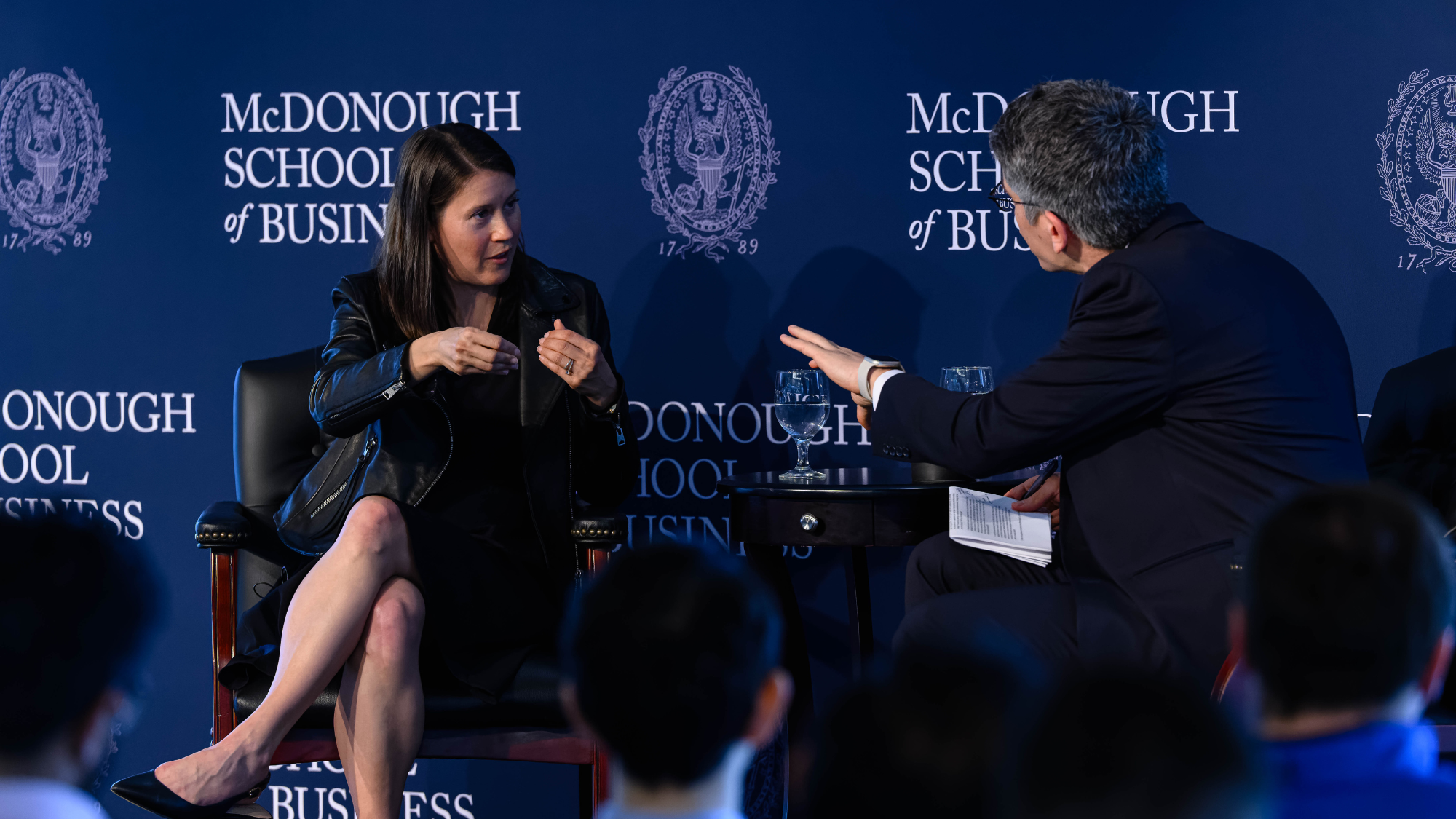Business of Sustainability Initiative Brings Leading Industry Voices to Campus
The Business of Sustainability Initiative (BSI) at Georgetown’s McDonough School of Business hosted thought-provoking leaders and industry experts during the spring Speaker Series – a cornerstone of the McDonough community’s engagement with leading voices in sustainability. Over the course of the semester, the initiative provided students, faculty, and professionals with invaluable exposure to diverse approaches for solving today’s most pressing environmental and economic challenges.
From sustainable finance to carbon removals to utility-scale energy transitions, each speaker reminded us that impactful change comes from bold innovation and careful strategy.
Speakers’ Insights

Tim Dunn
The series began with Tim Dunn, chief investment officer and managing partner at Terra Alpha Investments, who brings over 30 years of experience in sustainable investing. In a conversation moderated by Vishal Agrawal, Henry J. Blommer Family Endowed Chair in Sustainable Business and academic director of BSI, Dunn shared his philosophy of integrating environmental and social data into financial models to drive long-term, systemic value creation.
Drawing on his time at Capital Group and his advisory roles at CDP and The Nature Conservancy, Dunn emphasized how investors can accelerate corporate sustainability by aligning capital with companies that demonstrate transparency, resource efficiency, and climate responsibility. Attendees left with a deeper understanding of how environmental, social, and governance (ESG) factors are becoming indispensable to modern portfolio management, and how finance can be wielded as a tool for environmental stewardship.

Daniel Sierra
Next, the series welcomed Daniel Sierra, compliance director at Puro.earth, a leading platform for engineered carbon removal credits. In a conversation moderated by Şafak Yücel, associate professor of operations management and associate director of BSI, Sierra explored how companies are navigating the nascent but fast-evolving voluntary carbon market, while also emphasizing the importance of trust, rigor, and transparency in issuing high-integrity removal credits.
“I appreciated how he talked about the difference between removal and avoidance, and how avoidance relies on predictions whereas removal measures results,” said Ari Adusmuilli (MS-ESM’25). “This made me think more critically about different types of climate solutions and what strategies would be most effective for long-term climate goals.”

Sarah Adair
Rounding out the spring series was Sarah Adair, managing director of public policy at Duke Energy, one of the country’s largest utility providers. In her discussion with Yücel, Adair illuminated the complex landscape of energy policy, infrastructure modernization, and decarbonization from a utility standpoint. She shared how Duke Energy is navigating the tension between reliability, affordability, and the urgency of climate action, especially in regions heavily reliant on traditional energy sources.
“Ms. Adair addressed the challenge of measuring potential demand from AI development, noting they must carefully evaluate project realities before incorporating them into load forecasts,” noted Ninabella Arlis (B’26) during the Q&A. “I appreciated her approach to criticism, particularly regarding greenwashing accusations.”
Change Is Already Underway
Throughout the spring Speaker Series, industry leaders shared a rich and diverse array of perspectives and demonstrated that the business of sustainability requires vision, technical knowledge, and a collaborative spirit.
“The Speaker Series allows us to connect our community and discuss the most cutting-edge challenges and opportunities in the business of sustainability space,” noted Yücel. “The series also enables our community to engage not only with the industry leaders but also among themselves, providing a unique opportunity to expand their network.”
From Dunn’s insight on mobilizing capital to Sierra’s focus on building credible carbon markets to Adair’s on-the-ground policy leadership, this semester reaffirmed that change is already underway and that the next generation of leaders has a key role to play.


